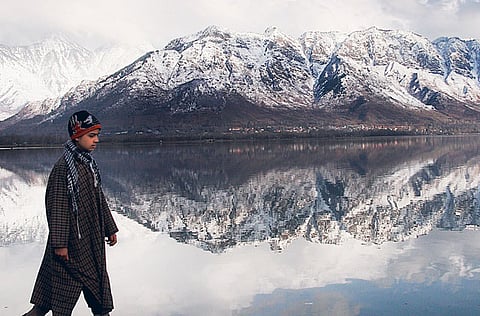Foreign climbers will have access to 100 peaks in India
Officials hope move will boost Kashmir's ailing hospitality industry affected by two decades of separatist violence

Srinagar: Mountaineers, rejoice: India will, for the first time, allow foreign climbers to scale more than 100 high-altitude peaks this summer in the Himalayan state of Jammu and Kashmir.
Officials said the move was an effort to boost the scenic region's ailing tourism industry, hit by two decades of separatist rebellion. Officials say 60 per cent of Kashmiris are dependent on tourism.
Kashmir was once dubbed the Switzerland of the east. It was once a key for climbers, skiers, honeymooners and film-makers drawn to the state's soaring peaks, fruit orchards and timber houseboats bobbing on Dal Lake in Srinagar, the summer capital.
But the number of visitors began falling after a revolt broke out in 1989 that has killed more than 47,000 people so far.
Militants
Pakistan and India have fought two wars over Muslim-majority Kashmir, which is divided between the South Asian neighbours who both claim it in full. India accuses Pakistan of backing separatist militants fighting its forces. Pakistan says it only offers them political backing.
The peaks to be opened for trekking and mountaineering are situated at an altitude ranging from 3,000 metres to 7,800 metres, mostly in the Eastern Karakoram mountain range of Ladakh.
"This summer 104 peaks in Ladakh region will open for trekking and expeditions which would pave the way for adventure tourism and attract foreign tourists in a big way," Nawang Rigzin Jora, Kashmir's tourism minister, told Reuters.
"The defence ministry, which had earlier expressed reservation on throwing open the peaks, has given its nod."
The mountainous Ladakh region along India's border with Pakistan and China, which has been largely free of rebel violence, is a heavily militarised zone.
"The situation is fast improving in the state and tourism is picking up, we hope a very good [tourist] season ahead," Jora added.
Officials say violence involving Indian troops and separatist militants has declined since a peace process began in 2004 between India and Pakistan.
But people are still killed in daily shootouts and occasional bomb attacks.
Many foreign governments still advise against travel to Kashmir, where six Western tourists were infamously abducted while trekking in 1995. Of the six, a Norwegian was beheaded, an American escaped and the rest are presumed dead.
Tourism operators say opening new peaks will help Kashmir tourism but they remain sceptical about a lasting peace in the region.
"Climbers will definitely find plenty to love in this remote and stunningly beautiful region, and this will help our business in a big way," Umar Tibatbakal, a tour operator said. "But Kashmir is unpredictable, violence can break out any time."



